University Assignment: Contemporary Hospitality Industry Report
VerifiedAdded on 2020/10/05
|11
|2860
|266
Report
AI Summary
This report provides a comprehensive overview of the contemporary hospitality industry in the UK. It begins by examining the scale, scope, and diversity of the industry, highlighting its contribution to economic growth and employment. The report then delves into the organizational structures of various hospitality businesses, contrasting small boutique hotels with large entities like the Elme Hall Hotel, and evaluating the roles of industry bodies such as the British Hospitality Industry and The Springboard. A significant portion of the report focuses on staffing requirements, detailing the roles, responsibilities, and qualifications necessary for different positions within the industry, including food service management, hotel management, and housekeeping. The analysis extends to operational, managerial, and legislative issues resulting from recent developments, as well as the current image of the industry, although the detailed content is covered in a PPT. Finally, the report presents potential trends and developments in the hospitality industry and their predicted impact, also covered in a PPT, concluding with a summary of key findings and recommendations.
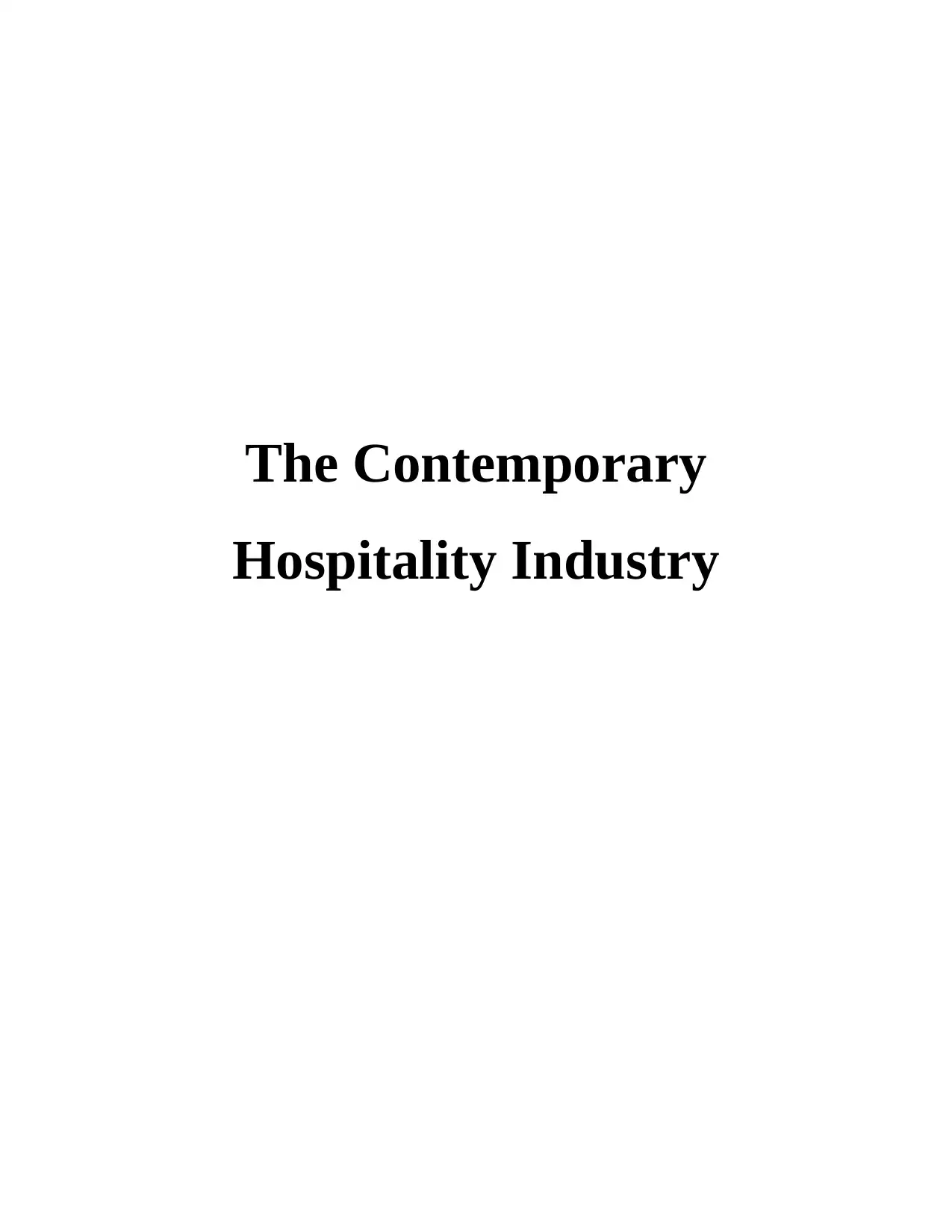
The Contemporary
Hospitality Industry
Hospitality Industry
Paraphrase This Document
Need a fresh take? Get an instant paraphrase of this document with our AI Paraphraser
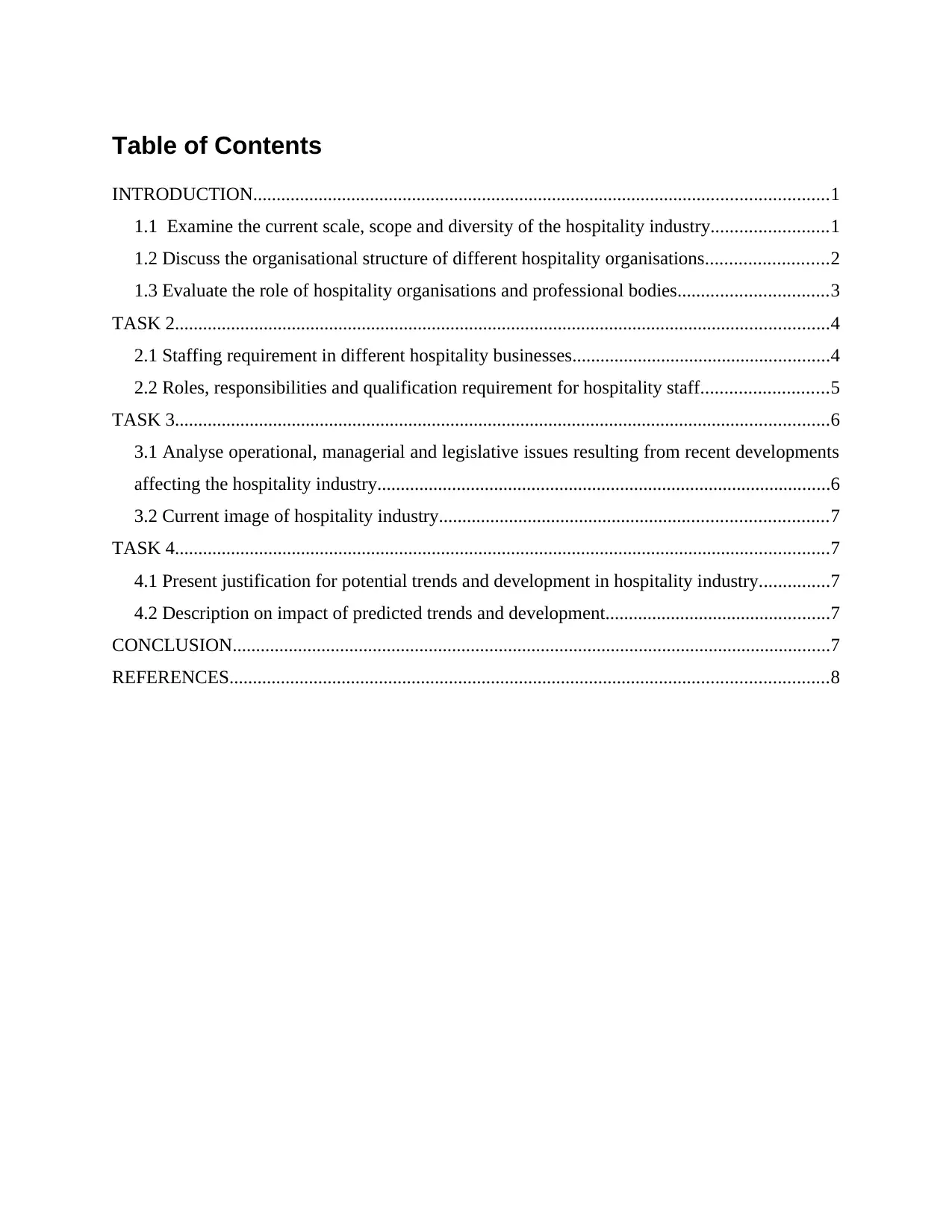
Table of Contents
INTRODUCTION...........................................................................................................................1
1.1 Examine the current scale, scope and diversity of the hospitality industry.........................1
1.2 Discuss the organisational structure of different hospitality organisations..........................2
1.3 Evaluate the role of hospitality organisations and professional bodies................................3
TASK 2............................................................................................................................................4
2.1 Staffing requirement in different hospitality businesses.......................................................4
2.2 Roles, responsibilities and qualification requirement for hospitality staff...........................5
TASK 3............................................................................................................................................6
3.1 Analyse operational, managerial and legislative issues resulting from recent developments
affecting the hospitality industry.................................................................................................6
3.2 Current image of hospitality industry...................................................................................7
TASK 4............................................................................................................................................7
4.1 Present justification for potential trends and development in hospitality industry...............7
4.2 Description on impact of predicted trends and development................................................7
CONCLUSION................................................................................................................................7
REFERENCES................................................................................................................................8
INTRODUCTION...........................................................................................................................1
1.1 Examine the current scale, scope and diversity of the hospitality industry.........................1
1.2 Discuss the organisational structure of different hospitality organisations..........................2
1.3 Evaluate the role of hospitality organisations and professional bodies................................3
TASK 2............................................................................................................................................4
2.1 Staffing requirement in different hospitality businesses.......................................................4
2.2 Roles, responsibilities and qualification requirement for hospitality staff...........................5
TASK 3............................................................................................................................................6
3.1 Analyse operational, managerial and legislative issues resulting from recent developments
affecting the hospitality industry.................................................................................................6
3.2 Current image of hospitality industry...................................................................................7
TASK 4............................................................................................................................................7
4.1 Present justification for potential trends and development in hospitality industry...............7
4.2 Description on impact of predicted trends and development................................................7
CONCLUSION................................................................................................................................7
REFERENCES................................................................................................................................8
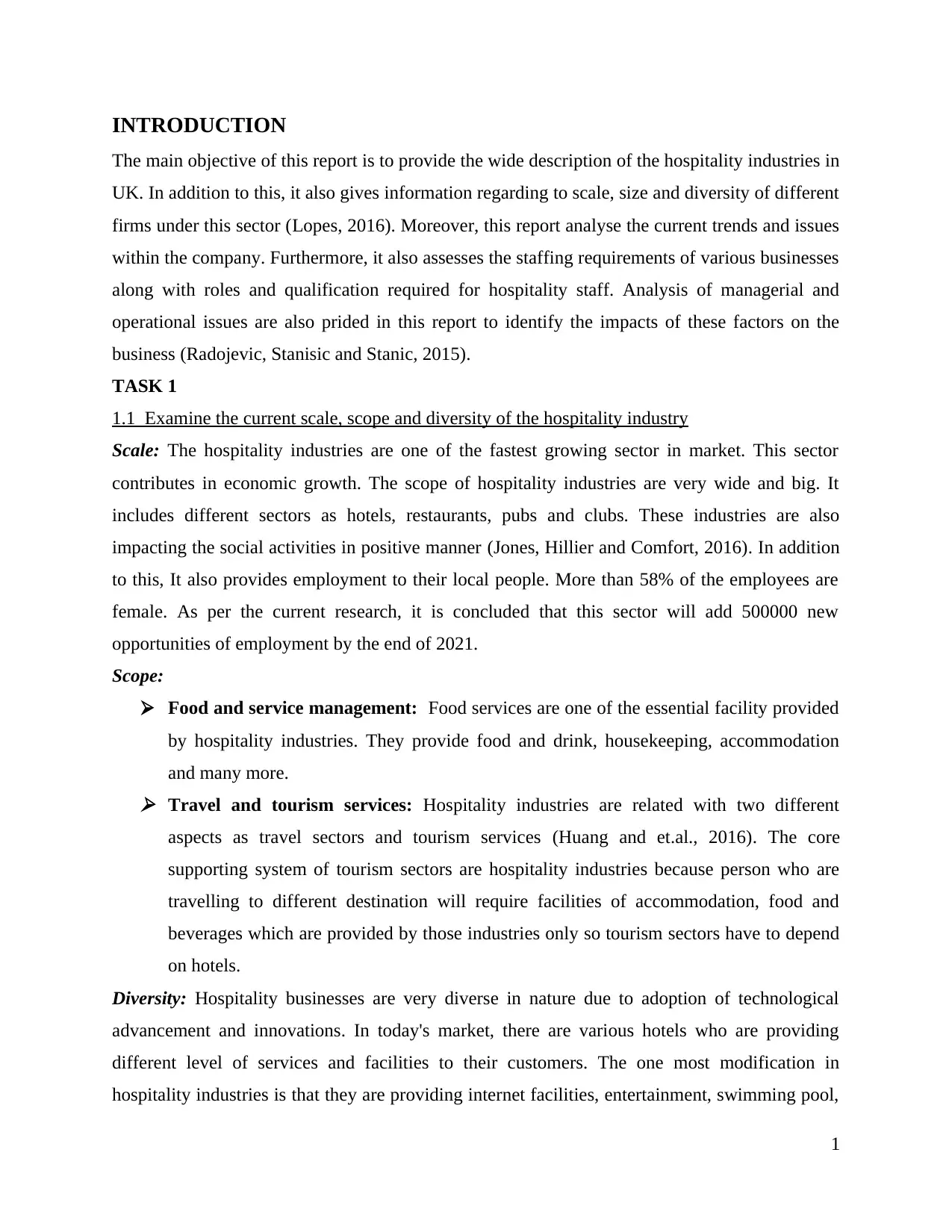
INTRODUCTION
The main objective of this report is to provide the wide description of the hospitality industries in
UK. In addition to this, it also gives information regarding to scale, size and diversity of different
firms under this sector (Lopes, 2016). Moreover, this report analyse the current trends and issues
within the company. Furthermore, it also assesses the staffing requirements of various businesses
along with roles and qualification required for hospitality staff. Analysis of managerial and
operational issues are also prided in this report to identify the impacts of these factors on the
business (Radojevic, Stanisic and Stanic, 2015).
TASK 1
1.1 Examine the current scale, scope and diversity of the hospitality industry
Scale: The hospitality industries are one of the fastest growing sector in market. This sector
contributes in economic growth. The scope of hospitality industries are very wide and big. It
includes different sectors as hotels, restaurants, pubs and clubs. These industries are also
impacting the social activities in positive manner (Jones, Hillier and Comfort, 2016). In addition
to this, It also provides employment to their local people. More than 58% of the employees are
female. As per the current research, it is concluded that this sector will add 500000 new
opportunities of employment by the end of 2021.
Scope:
Food and service management: Food services are one of the essential facility provided
by hospitality industries. They provide food and drink, housekeeping, accommodation
and many more. Travel and tourism services: Hospitality industries are related with two different
aspects as travel sectors and tourism services (Huang and et.al., 2016). The core
supporting system of tourism sectors are hospitality industries because person who are
travelling to different destination will require facilities of accommodation, food and
beverages which are provided by those industries only so tourism sectors have to depend
on hotels.
Diversity: Hospitality businesses are very diverse in nature due to adoption of technological
advancement and innovations. In today's market, there are various hotels who are providing
different level of services and facilities to their customers. The one most modification in
hospitality industries is that they are providing internet facilities, entertainment, swimming pool,
1
The main objective of this report is to provide the wide description of the hospitality industries in
UK. In addition to this, it also gives information regarding to scale, size and diversity of different
firms under this sector (Lopes, 2016). Moreover, this report analyse the current trends and issues
within the company. Furthermore, it also assesses the staffing requirements of various businesses
along with roles and qualification required for hospitality staff. Analysis of managerial and
operational issues are also prided in this report to identify the impacts of these factors on the
business (Radojevic, Stanisic and Stanic, 2015).
TASK 1
1.1 Examine the current scale, scope and diversity of the hospitality industry
Scale: The hospitality industries are one of the fastest growing sector in market. This sector
contributes in economic growth. The scope of hospitality industries are very wide and big. It
includes different sectors as hotels, restaurants, pubs and clubs. These industries are also
impacting the social activities in positive manner (Jones, Hillier and Comfort, 2016). In addition
to this, It also provides employment to their local people. More than 58% of the employees are
female. As per the current research, it is concluded that this sector will add 500000 new
opportunities of employment by the end of 2021.
Scope:
Food and service management: Food services are one of the essential facility provided
by hospitality industries. They provide food and drink, housekeeping, accommodation
and many more. Travel and tourism services: Hospitality industries are related with two different
aspects as travel sectors and tourism services (Huang and et.al., 2016). The core
supporting system of tourism sectors are hospitality industries because person who are
travelling to different destination will require facilities of accommodation, food and
beverages which are provided by those industries only so tourism sectors have to depend
on hotels.
Diversity: Hospitality businesses are very diverse in nature due to adoption of technological
advancement and innovations. In today's market, there are various hotels who are providing
different level of services and facilities to their customers. The one most modification in
hospitality industries is that they are providing internet facilities, entertainment, swimming pool,
1
⊘ This is a preview!⊘
Do you want full access?
Subscribe today to unlock all pages.

Trusted by 1+ million students worldwide
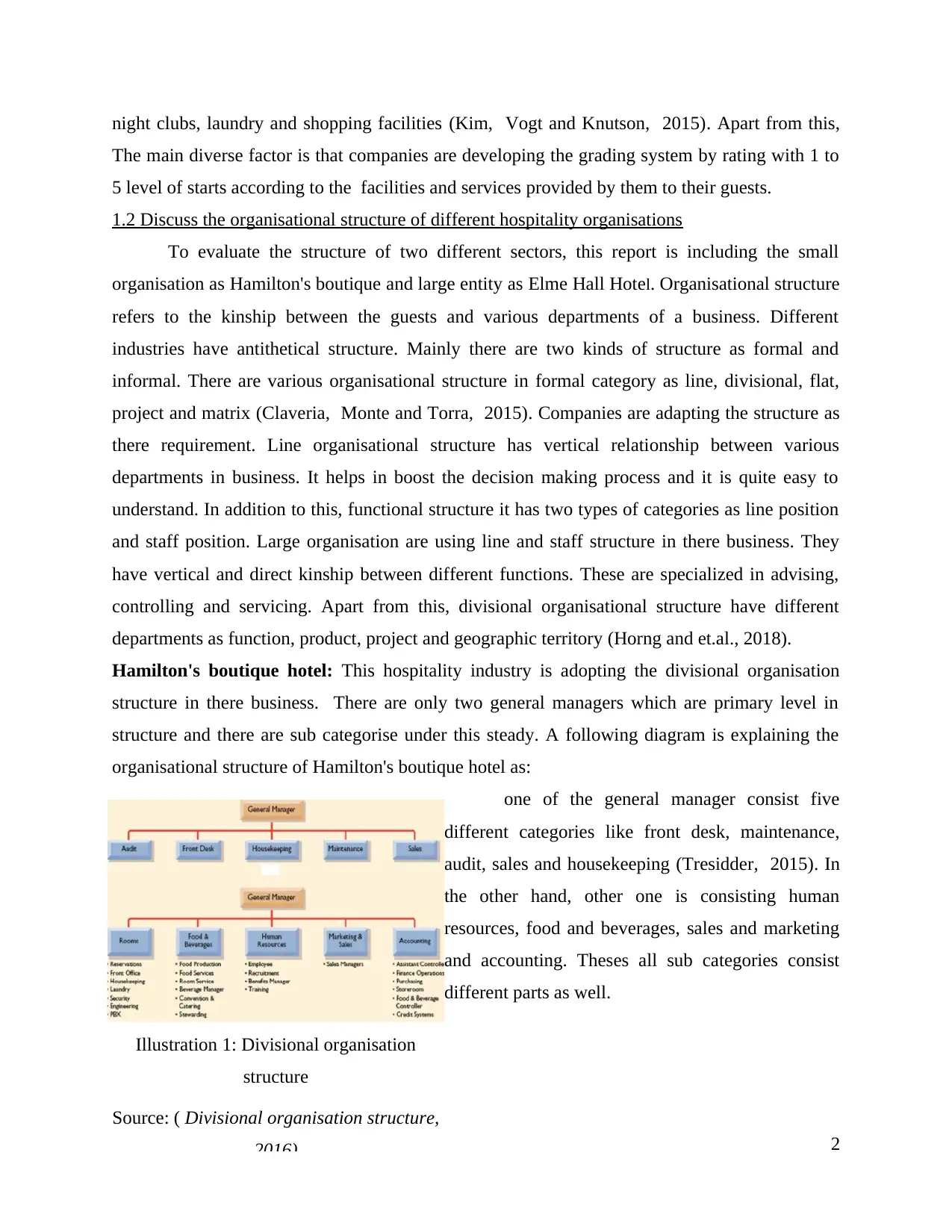
night clubs, laundry and shopping facilities (Kim, Vogt and Knutson, 2015). Apart from this,
The main diverse factor is that companies are developing the grading system by rating with 1 to
5 level of starts according to the facilities and services provided by them to their guests.
1.2 Discuss the organisational structure of different hospitality organisations
To evaluate the structure of two different sectors, this report is including the small
organisation as Hamilton's boutique and large entity as Elme Hall Hotel. Organisational structure
refers to the kinship between the guests and various departments of a business. Different
industries have antithetical structure. Mainly there are two kinds of structure as formal and
informal. There are various organisational structure in formal category as line, divisional, flat,
project and matrix (Claveria, Monte and Torra, 2015). Companies are adapting the structure as
there requirement. Line organisational structure has vertical relationship between various
departments in business. It helps in boost the decision making process and it is quite easy to
understand. In addition to this, functional structure it has two types of categories as line position
and staff position. Large organisation are using line and staff structure in there business. They
have vertical and direct kinship between different functions. These are specialized in advising,
controlling and servicing. Apart from this, divisional organisational structure have different
departments as function, product, project and geographic territory (Horng and et.al., 2018).
Hamilton's boutique hotel: This hospitality industry is adopting the divisional organisation
structure in there business. There are only two general managers which are primary level in
structure and there are sub categorise under this steady. A following diagram is explaining the
organisational structure of Hamilton's boutique hotel as:
one of the general manager consist five
different categories like front desk, maintenance,
audit, sales and housekeeping (Tresidder, 2015). In
the other hand, other one is consisting human
resources, food and beverages, sales and marketing
and accounting. Theses all sub categories consist
different parts as well.
2
Illustration 1: Divisional organisation
structure
Source: ( Divisional organisation structure,
2016)
The main diverse factor is that companies are developing the grading system by rating with 1 to
5 level of starts according to the facilities and services provided by them to their guests.
1.2 Discuss the organisational structure of different hospitality organisations
To evaluate the structure of two different sectors, this report is including the small
organisation as Hamilton's boutique and large entity as Elme Hall Hotel. Organisational structure
refers to the kinship between the guests and various departments of a business. Different
industries have antithetical structure. Mainly there are two kinds of structure as formal and
informal. There are various organisational structure in formal category as line, divisional, flat,
project and matrix (Claveria, Monte and Torra, 2015). Companies are adapting the structure as
there requirement. Line organisational structure has vertical relationship between various
departments in business. It helps in boost the decision making process and it is quite easy to
understand. In addition to this, functional structure it has two types of categories as line position
and staff position. Large organisation are using line and staff structure in there business. They
have vertical and direct kinship between different functions. These are specialized in advising,
controlling and servicing. Apart from this, divisional organisational structure have different
departments as function, product, project and geographic territory (Horng and et.al., 2018).
Hamilton's boutique hotel: This hospitality industry is adopting the divisional organisation
structure in there business. There are only two general managers which are primary level in
structure and there are sub categorise under this steady. A following diagram is explaining the
organisational structure of Hamilton's boutique hotel as:
one of the general manager consist five
different categories like front desk, maintenance,
audit, sales and housekeeping (Tresidder, 2015). In
the other hand, other one is consisting human
resources, food and beverages, sales and marketing
and accounting. Theses all sub categories consist
different parts as well.
2
Illustration 1: Divisional organisation
structure
Source: ( Divisional organisation structure,
2016)
Paraphrase This Document
Need a fresh take? Get an instant paraphrase of this document with our AI Paraphraser
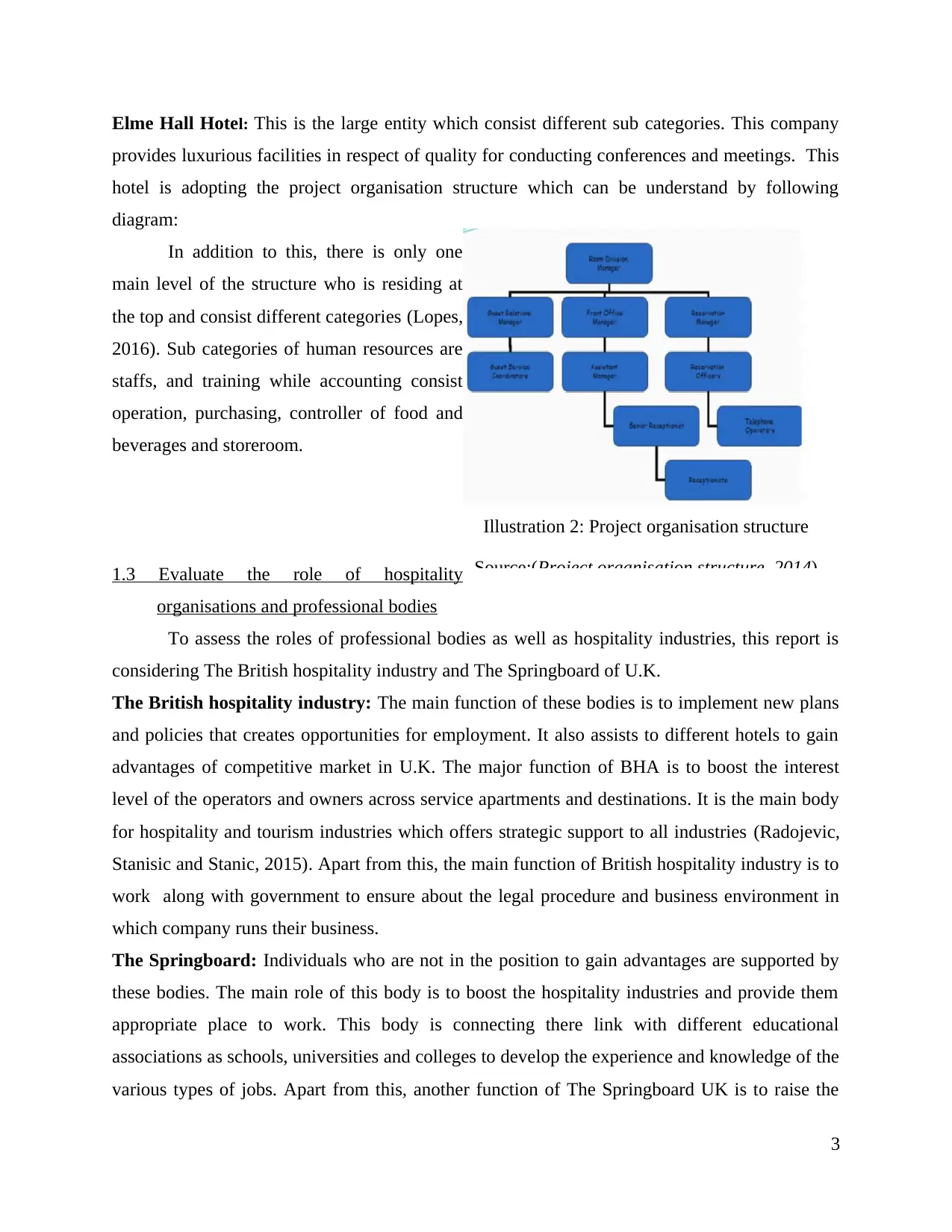
Elme Hall Hotel: This is the large entity which consist different sub categories. This company
provides luxurious facilities in respect of quality for conducting conferences and meetings. This
hotel is adopting the project organisation structure which can be understand by following
diagram:
In addition to this, there is only one
main level of the structure who is residing at
the top and consist different categories (Lopes,
2016). Sub categories of human resources are
staffs, and training while accounting consist
operation, purchasing, controller of food and
beverages and storeroom.
1.3 Evaluate the role of hospitality
organisations and professional bodies
To assess the roles of professional bodies as well as hospitality industries, this report is
considering The British hospitality industry and The Springboard of U.K.
The British hospitality industry: The main function of these bodies is to implement new plans
and policies that creates opportunities for employment. It also assists to different hotels to gain
advantages of competitive market in U.K. The major function of BHA is to boost the interest
level of the operators and owners across service apartments and destinations. It is the main body
for hospitality and tourism industries which offers strategic support to all industries (Radojevic,
Stanisic and Stanic, 2015). Apart from this, the main function of British hospitality industry is to
work along with government to ensure about the legal procedure and business environment in
which company runs their business.
The Springboard: Individuals who are not in the position to gain advantages are supported by
these bodies. The main role of this body is to boost the hospitality industries and provide them
appropriate place to work. This body is connecting there link with different educational
associations as schools, universities and colleges to develop the experience and knowledge of the
various types of jobs. Apart from this, another function of The Springboard UK is to raise the
3
Illustration 2: Project organisation structure
Source:(Project organisation structure, 2014)
provides luxurious facilities in respect of quality for conducting conferences and meetings. This
hotel is adopting the project organisation structure which can be understand by following
diagram:
In addition to this, there is only one
main level of the structure who is residing at
the top and consist different categories (Lopes,
2016). Sub categories of human resources are
staffs, and training while accounting consist
operation, purchasing, controller of food and
beverages and storeroom.
1.3 Evaluate the role of hospitality
organisations and professional bodies
To assess the roles of professional bodies as well as hospitality industries, this report is
considering The British hospitality industry and The Springboard of U.K.
The British hospitality industry: The main function of these bodies is to implement new plans
and policies that creates opportunities for employment. It also assists to different hotels to gain
advantages of competitive market in U.K. The major function of BHA is to boost the interest
level of the operators and owners across service apartments and destinations. It is the main body
for hospitality and tourism industries which offers strategic support to all industries (Radojevic,
Stanisic and Stanic, 2015). Apart from this, the main function of British hospitality industry is to
work along with government to ensure about the legal procedure and business environment in
which company runs their business.
The Springboard: Individuals who are not in the position to gain advantages are supported by
these bodies. The main role of this body is to boost the hospitality industries and provide them
appropriate place to work. This body is connecting there link with different educational
associations as schools, universities and colleges to develop the experience and knowledge of the
various types of jobs. Apart from this, another function of The Springboard UK is to raise the
3
Illustration 2: Project organisation structure
Source:(Project organisation structure, 2014)
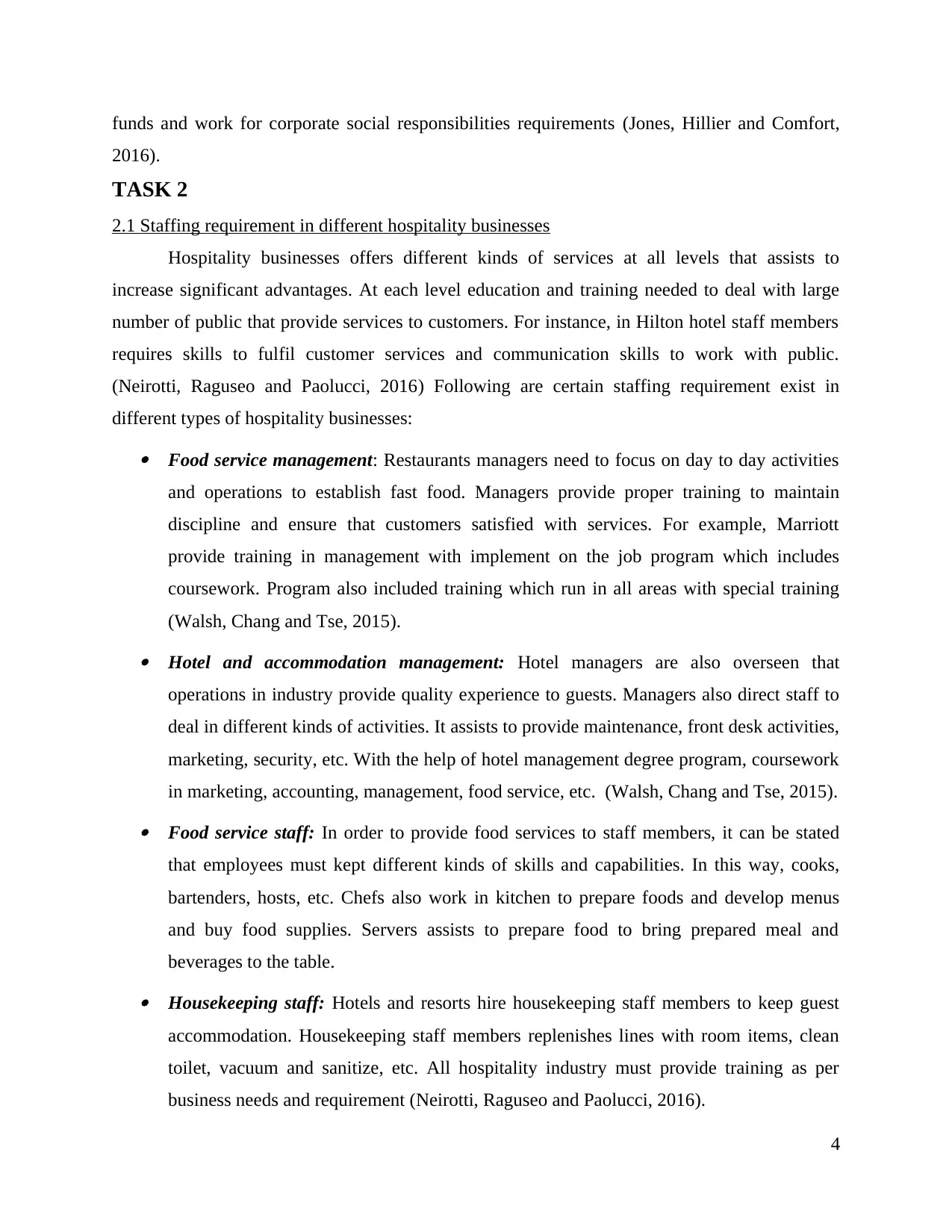
funds and work for corporate social responsibilities requirements (Jones, Hillier and Comfort,
2016).
TASK 2
2.1 Staffing requirement in different hospitality businesses
Hospitality businesses offers different kinds of services at all levels that assists to
increase significant advantages. At each level education and training needed to deal with large
number of public that provide services to customers. For instance, in Hilton hotel staff members
requires skills to fulfil customer services and communication skills to work with public.
(Neirotti, Raguseo and Paolucci, 2016) Following are certain staffing requirement exist in
different types of hospitality businesses: Food service management: Restaurants managers need to focus on day to day activities
and operations to establish fast food. Managers provide proper training to maintain
discipline and ensure that customers satisfied with services. For example, Marriott
provide training in management with implement on the job program which includes
coursework. Program also included training which run in all areas with special training
(Walsh, Chang and Tse, 2015). Hotel and accommodation management: Hotel managers are also overseen that
operations in industry provide quality experience to guests. Managers also direct staff to
deal in different kinds of activities. It assists to provide maintenance, front desk activities,
marketing, security, etc. With the help of hotel management degree program, coursework
in marketing, accounting, management, food service, etc. (Walsh, Chang and Tse, 2015). Food service staff: In order to provide food services to staff members, it can be stated
that employees must kept different kinds of skills and capabilities. In this way, cooks,
bartenders, hosts, etc. Chefs also work in kitchen to prepare foods and develop menus
and buy food supplies. Servers assists to prepare food to bring prepared meal and
beverages to the table. Housekeeping staff: Hotels and resorts hire housekeeping staff members to keep guest
accommodation. Housekeeping staff members replenishes lines with room items, clean
toilet, vacuum and sanitize, etc. All hospitality industry must provide training as per
business needs and requirement (Neirotti, Raguseo and Paolucci, 2016).
4
2016).
TASK 2
2.1 Staffing requirement in different hospitality businesses
Hospitality businesses offers different kinds of services at all levels that assists to
increase significant advantages. At each level education and training needed to deal with large
number of public that provide services to customers. For instance, in Hilton hotel staff members
requires skills to fulfil customer services and communication skills to work with public.
(Neirotti, Raguseo and Paolucci, 2016) Following are certain staffing requirement exist in
different types of hospitality businesses: Food service management: Restaurants managers need to focus on day to day activities
and operations to establish fast food. Managers provide proper training to maintain
discipline and ensure that customers satisfied with services. For example, Marriott
provide training in management with implement on the job program which includes
coursework. Program also included training which run in all areas with special training
(Walsh, Chang and Tse, 2015). Hotel and accommodation management: Hotel managers are also overseen that
operations in industry provide quality experience to guests. Managers also direct staff to
deal in different kinds of activities. It assists to provide maintenance, front desk activities,
marketing, security, etc. With the help of hotel management degree program, coursework
in marketing, accounting, management, food service, etc. (Walsh, Chang and Tse, 2015). Food service staff: In order to provide food services to staff members, it can be stated
that employees must kept different kinds of skills and capabilities. In this way, cooks,
bartenders, hosts, etc. Chefs also work in kitchen to prepare foods and develop menus
and buy food supplies. Servers assists to prepare food to bring prepared meal and
beverages to the table. Housekeeping staff: Hotels and resorts hire housekeeping staff members to keep guest
accommodation. Housekeeping staff members replenishes lines with room items, clean
toilet, vacuum and sanitize, etc. All hospitality industry must provide training as per
business needs and requirement (Neirotti, Raguseo and Paolucci, 2016).
4
⊘ This is a preview!⊘
Do you want full access?
Subscribe today to unlock all pages.

Trusted by 1+ million students worldwide
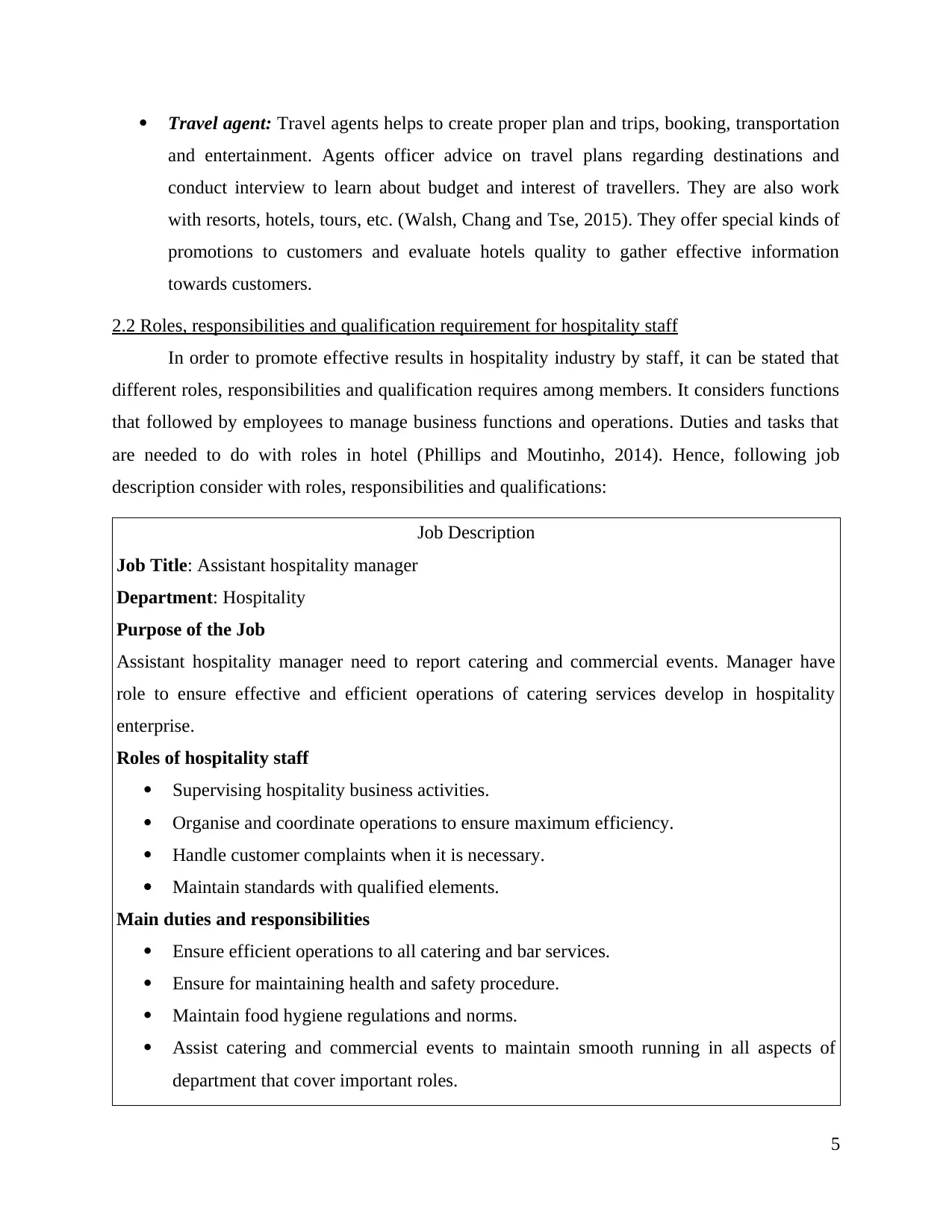
Travel agent: Travel agents helps to create proper plan and trips, booking, transportation
and entertainment. Agents officer advice on travel plans regarding destinations and
conduct interview to learn about budget and interest of travellers. They are also work
with resorts, hotels, tours, etc. (Walsh, Chang and Tse, 2015). They offer special kinds of
promotions to customers and evaluate hotels quality to gather effective information
towards customers.
2.2 Roles, responsibilities and qualification requirement for hospitality staff
In order to promote effective results in hospitality industry by staff, it can be stated that
different roles, responsibilities and qualification requires among members. It considers functions
that followed by employees to manage business functions and operations. Duties and tasks that
are needed to do with roles in hotel (Phillips and Moutinho, 2014). Hence, following job
description consider with roles, responsibilities and qualifications:
Job Description
Job Title: Assistant hospitality manager
Department: Hospitality
Purpose of the Job
Assistant hospitality manager need to report catering and commercial events. Manager have
role to ensure effective and efficient operations of catering services develop in hospitality
enterprise.
Roles of hospitality staff
Supervising hospitality business activities.
Organise and coordinate operations to ensure maximum efficiency.
Handle customer complaints when it is necessary.
Maintain standards with qualified elements.
Main duties and responsibilities
Ensure efficient operations to all catering and bar services.
Ensure for maintaining health and safety procedure.
Maintain food hygiene regulations and norms.
Assist catering and commercial events to maintain smooth running in all aspects of
department that cover important roles.
5
and entertainment. Agents officer advice on travel plans regarding destinations and
conduct interview to learn about budget and interest of travellers. They are also work
with resorts, hotels, tours, etc. (Walsh, Chang and Tse, 2015). They offer special kinds of
promotions to customers and evaluate hotels quality to gather effective information
towards customers.
2.2 Roles, responsibilities and qualification requirement for hospitality staff
In order to promote effective results in hospitality industry by staff, it can be stated that
different roles, responsibilities and qualification requires among members. It considers functions
that followed by employees to manage business functions and operations. Duties and tasks that
are needed to do with roles in hotel (Phillips and Moutinho, 2014). Hence, following job
description consider with roles, responsibilities and qualifications:
Job Description
Job Title: Assistant hospitality manager
Department: Hospitality
Purpose of the Job
Assistant hospitality manager need to report catering and commercial events. Manager have
role to ensure effective and efficient operations of catering services develop in hospitality
enterprise.
Roles of hospitality staff
Supervising hospitality business activities.
Organise and coordinate operations to ensure maximum efficiency.
Handle customer complaints when it is necessary.
Maintain standards with qualified elements.
Main duties and responsibilities
Ensure efficient operations to all catering and bar services.
Ensure for maintaining health and safety procedure.
Maintain food hygiene regulations and norms.
Assist catering and commercial events to maintain smooth running in all aspects of
department that cover important roles.
5
Paraphrase This Document
Need a fresh take? Get an instant paraphrase of this document with our AI Paraphraser
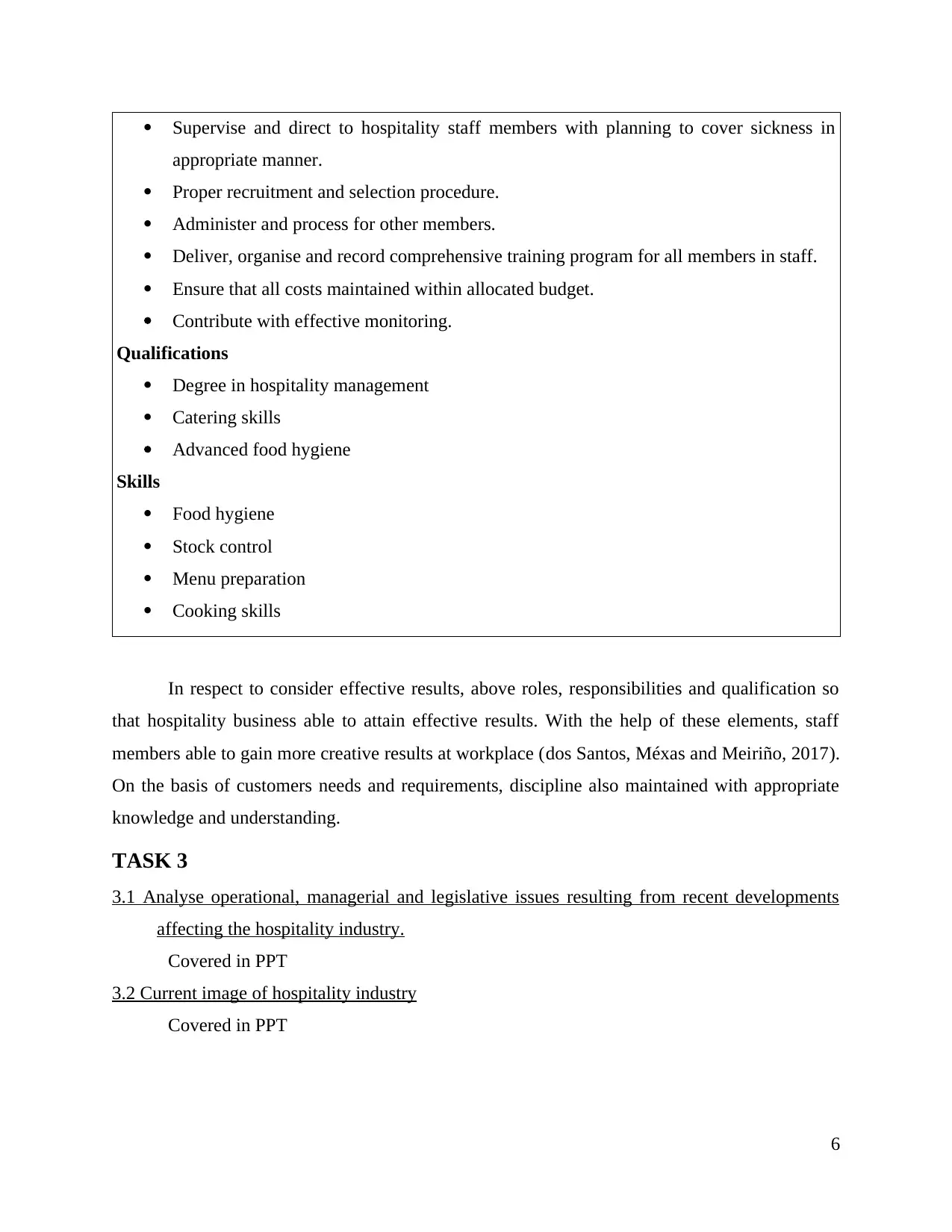
Supervise and direct to hospitality staff members with planning to cover sickness in
appropriate manner.
Proper recruitment and selection procedure.
Administer and process for other members.
Deliver, organise and record comprehensive training program for all members in staff.
Ensure that all costs maintained within allocated budget.
Contribute with effective monitoring.
Qualifications
Degree in hospitality management
Catering skills
Advanced food hygiene
Skills
Food hygiene
Stock control
Menu preparation
Cooking skills
In respect to consider effective results, above roles, responsibilities and qualification so
that hospitality business able to attain effective results. With the help of these elements, staff
members able to gain more creative results at workplace (dos Santos, Méxas and Meiriño, 2017).
On the basis of customers needs and requirements, discipline also maintained with appropriate
knowledge and understanding.
TASK 3
3.1 Analyse operational, managerial and legislative issues resulting from recent developments
affecting the hospitality industry.
Covered in PPT
3.2 Current image of hospitality industry
Covered in PPT
6
appropriate manner.
Proper recruitment and selection procedure.
Administer and process for other members.
Deliver, organise and record comprehensive training program for all members in staff.
Ensure that all costs maintained within allocated budget.
Contribute with effective monitoring.
Qualifications
Degree in hospitality management
Catering skills
Advanced food hygiene
Skills
Food hygiene
Stock control
Menu preparation
Cooking skills
In respect to consider effective results, above roles, responsibilities and qualification so
that hospitality business able to attain effective results. With the help of these elements, staff
members able to gain more creative results at workplace (dos Santos, Méxas and Meiriño, 2017).
On the basis of customers needs and requirements, discipline also maintained with appropriate
knowledge and understanding.
TASK 3
3.1 Analyse operational, managerial and legislative issues resulting from recent developments
affecting the hospitality industry.
Covered in PPT
3.2 Current image of hospitality industry
Covered in PPT
6
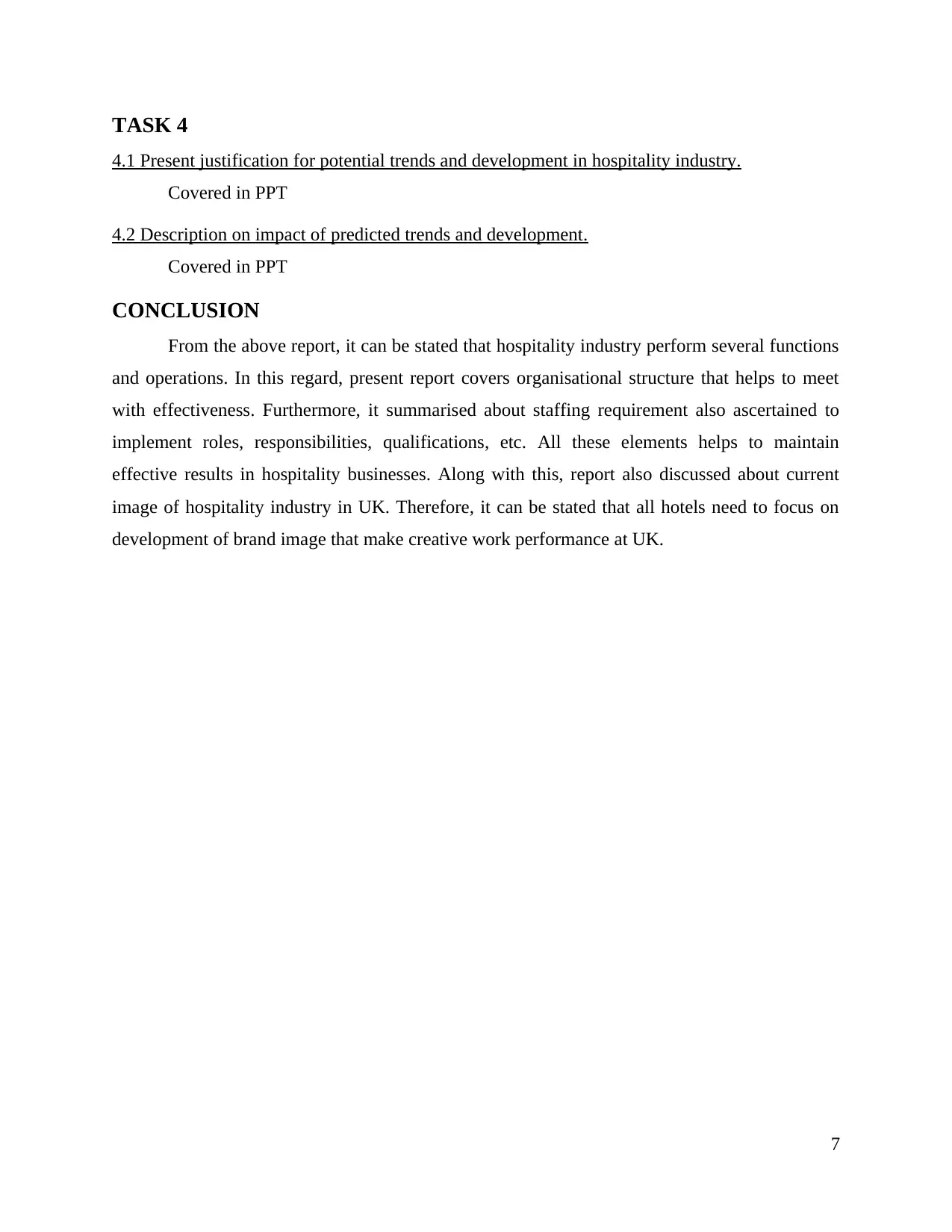
TASK 4
4.1 Present justification for potential trends and development in hospitality industry.
Covered in PPT
4.2 Description on impact of predicted trends and development.
Covered in PPT
CONCLUSION
From the above report, it can be stated that hospitality industry perform several functions
and operations. In this regard, present report covers organisational structure that helps to meet
with effectiveness. Furthermore, it summarised about staffing requirement also ascertained to
implement roles, responsibilities, qualifications, etc. All these elements helps to maintain
effective results in hospitality businesses. Along with this, report also discussed about current
image of hospitality industry in UK. Therefore, it can be stated that all hotels need to focus on
development of brand image that make creative work performance at UK.
7
4.1 Present justification for potential trends and development in hospitality industry.
Covered in PPT
4.2 Description on impact of predicted trends and development.
Covered in PPT
CONCLUSION
From the above report, it can be stated that hospitality industry perform several functions
and operations. In this regard, present report covers organisational structure that helps to meet
with effectiveness. Furthermore, it summarised about staffing requirement also ascertained to
implement roles, responsibilities, qualifications, etc. All these elements helps to maintain
effective results in hospitality businesses. Along with this, report also discussed about current
image of hospitality industry in UK. Therefore, it can be stated that all hotels need to focus on
development of brand image that make creative work performance at UK.
7
⊘ This is a preview!⊘
Do you want full access?
Subscribe today to unlock all pages.

Trusted by 1+ million students worldwide
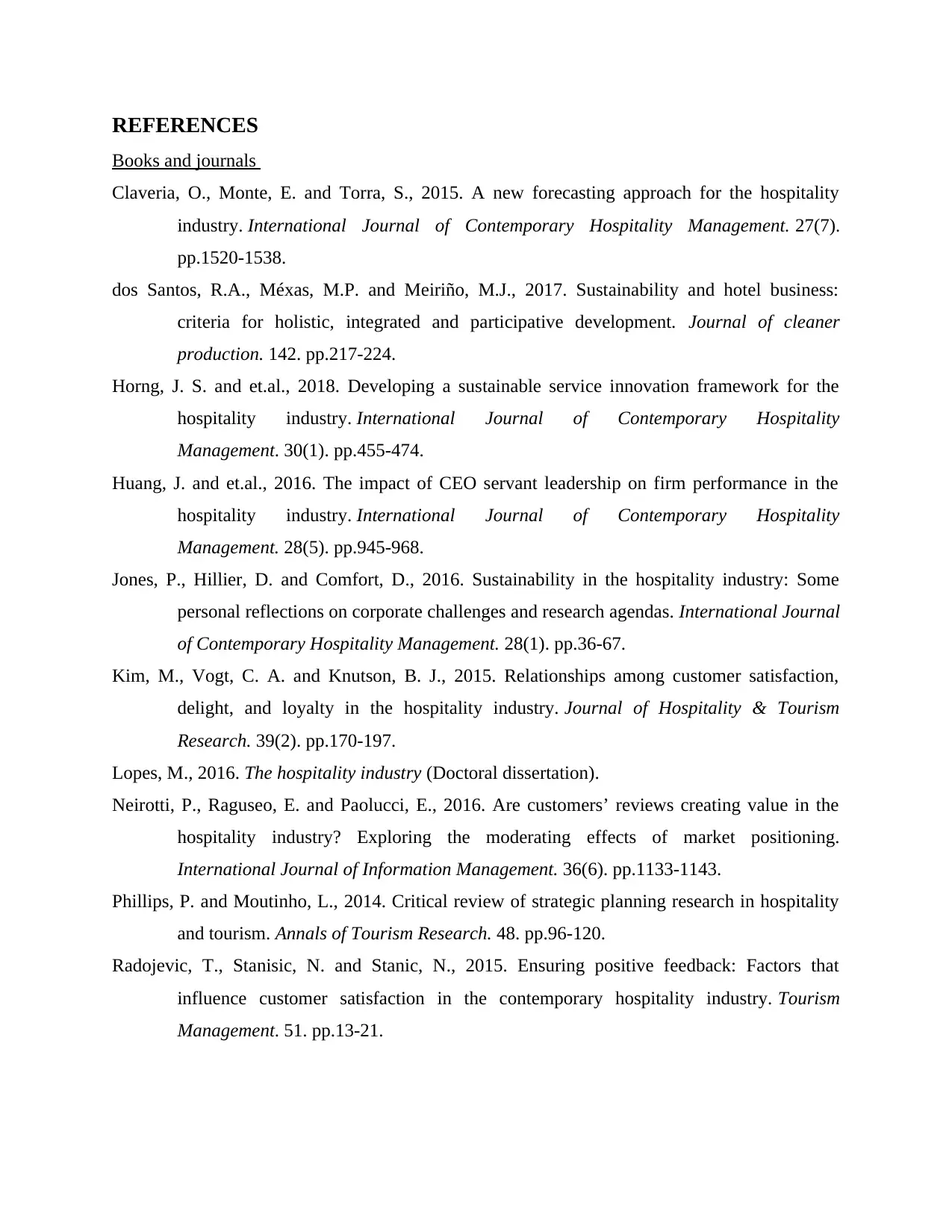
REFERENCES
Books and journals
Claveria, O., Monte, E. and Torra, S., 2015. A new forecasting approach for the hospitality
industry. International Journal of Contemporary Hospitality Management. 27(7).
pp.1520-1538.
dos Santos, R.A., Méxas, M.P. and Meiriño, M.J., 2017. Sustainability and hotel business:
criteria for holistic, integrated and participative development. Journal of cleaner
production. 142. pp.217-224.
Horng, J. S. and et.al., 2018. Developing a sustainable service innovation framework for the
hospitality industry. International Journal of Contemporary Hospitality
Management. 30(1). pp.455-474.
Huang, J. and et.al., 2016. The impact of CEO servant leadership on firm performance in the
hospitality industry. International Journal of Contemporary Hospitality
Management. 28(5). pp.945-968.
Jones, P., Hillier, D. and Comfort, D., 2016. Sustainability in the hospitality industry: Some
personal reflections on corporate challenges and research agendas. International Journal
of Contemporary Hospitality Management. 28(1). pp.36-67.
Kim, M., Vogt, C. A. and Knutson, B. J., 2015. Relationships among customer satisfaction,
delight, and loyalty in the hospitality industry. Journal of Hospitality & Tourism
Research. 39(2). pp.170-197.
Lopes, M., 2016. The hospitality industry (Doctoral dissertation).
Neirotti, P., Raguseo, E. and Paolucci, E., 2016. Are customers’ reviews creating value in the
hospitality industry? Exploring the moderating effects of market positioning.
International Journal of Information Management. 36(6). pp.1133-1143.
Phillips, P. and Moutinho, L., 2014. Critical review of strategic planning research in hospitality
and tourism. Annals of Tourism Research. 48. pp.96-120.
Radojevic, T., Stanisic, N. and Stanic, N., 2015. Ensuring positive feedback: Factors that
influence customer satisfaction in the contemporary hospitality industry. Tourism
Management. 51. pp.13-21.
Books and journals
Claveria, O., Monte, E. and Torra, S., 2015. A new forecasting approach for the hospitality
industry. International Journal of Contemporary Hospitality Management. 27(7).
pp.1520-1538.
dos Santos, R.A., Méxas, M.P. and Meiriño, M.J., 2017. Sustainability and hotel business:
criteria for holistic, integrated and participative development. Journal of cleaner
production. 142. pp.217-224.
Horng, J. S. and et.al., 2018. Developing a sustainable service innovation framework for the
hospitality industry. International Journal of Contemporary Hospitality
Management. 30(1). pp.455-474.
Huang, J. and et.al., 2016. The impact of CEO servant leadership on firm performance in the
hospitality industry. International Journal of Contemporary Hospitality
Management. 28(5). pp.945-968.
Jones, P., Hillier, D. and Comfort, D., 2016. Sustainability in the hospitality industry: Some
personal reflections on corporate challenges and research agendas. International Journal
of Contemporary Hospitality Management. 28(1). pp.36-67.
Kim, M., Vogt, C. A. and Knutson, B. J., 2015. Relationships among customer satisfaction,
delight, and loyalty in the hospitality industry. Journal of Hospitality & Tourism
Research. 39(2). pp.170-197.
Lopes, M., 2016. The hospitality industry (Doctoral dissertation).
Neirotti, P., Raguseo, E. and Paolucci, E., 2016. Are customers’ reviews creating value in the
hospitality industry? Exploring the moderating effects of market positioning.
International Journal of Information Management. 36(6). pp.1133-1143.
Phillips, P. and Moutinho, L., 2014. Critical review of strategic planning research in hospitality
and tourism. Annals of Tourism Research. 48. pp.96-120.
Radojevic, T., Stanisic, N. and Stanic, N., 2015. Ensuring positive feedback: Factors that
influence customer satisfaction in the contemporary hospitality industry. Tourism
Management. 51. pp.13-21.
Paraphrase This Document
Need a fresh take? Get an instant paraphrase of this document with our AI Paraphraser
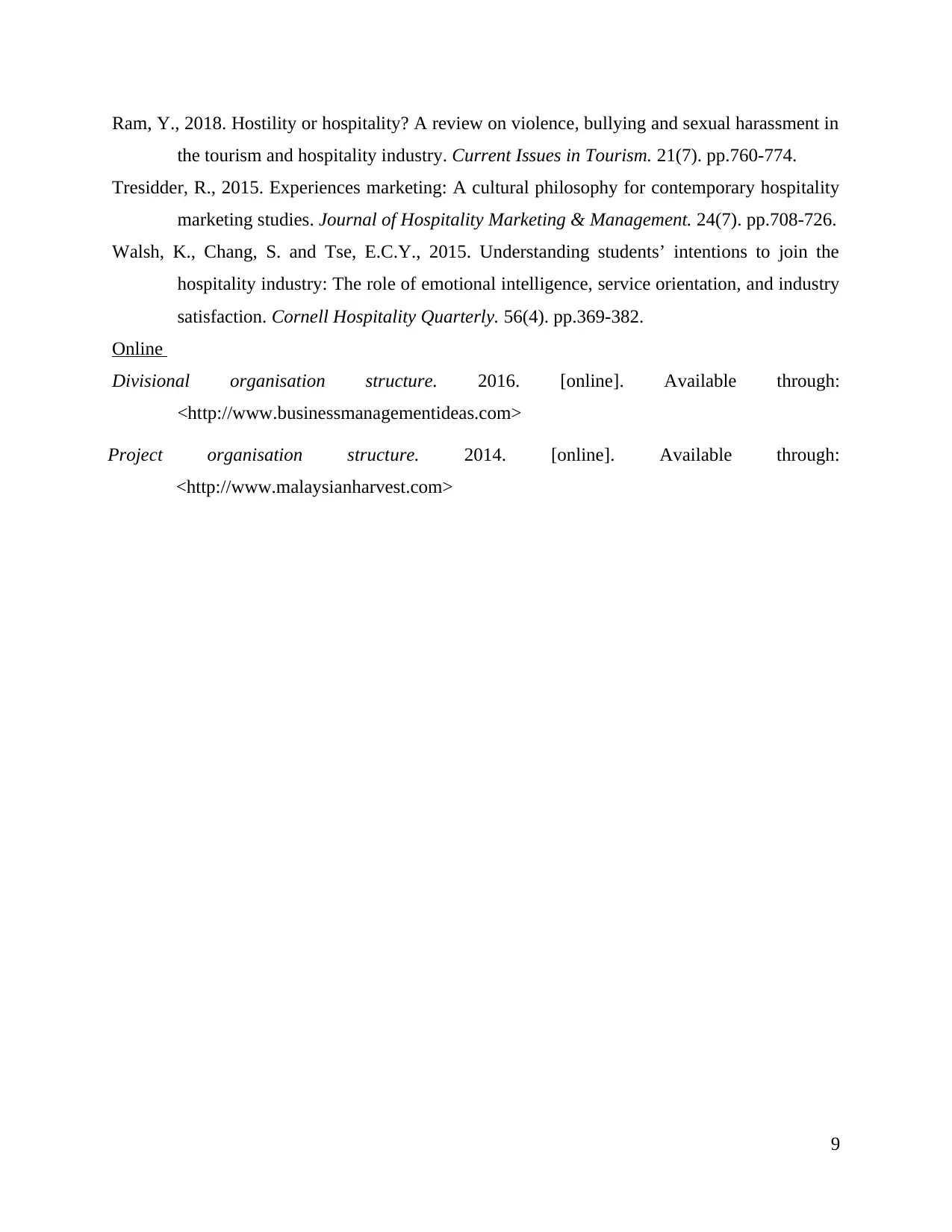
Ram, Y., 2018. Hostility or hospitality? A review on violence, bullying and sexual harassment in
the tourism and hospitality industry. Current Issues in Tourism. 21(7). pp.760-774.
Tresidder, R., 2015. Experiences marketing: A cultural philosophy for contemporary hospitality
marketing studies. Journal of Hospitality Marketing & Management. 24(7). pp.708-726.
Walsh, K., Chang, S. and Tse, E.C.Y., 2015. Understanding students’ intentions to join the
hospitality industry: The role of emotional intelligence, service orientation, and industry
satisfaction. Cornell Hospitality Quarterly. 56(4). pp.369-382.
Online
Divisional organisation structure. 2016. [online]. Available through:
<http://www.businessmanagementideas.com>
Project organisation structure. 2014. [online]. Available through:
<http://www.malaysianharvest.com>
9
the tourism and hospitality industry. Current Issues in Tourism. 21(7). pp.760-774.
Tresidder, R., 2015. Experiences marketing: A cultural philosophy for contemporary hospitality
marketing studies. Journal of Hospitality Marketing & Management. 24(7). pp.708-726.
Walsh, K., Chang, S. and Tse, E.C.Y., 2015. Understanding students’ intentions to join the
hospitality industry: The role of emotional intelligence, service orientation, and industry
satisfaction. Cornell Hospitality Quarterly. 56(4). pp.369-382.
Online
Divisional organisation structure. 2016. [online]. Available through:
<http://www.businessmanagementideas.com>
Project organisation structure. 2014. [online]. Available through:
<http://www.malaysianharvest.com>
9
1 out of 11
Related Documents
Your All-in-One AI-Powered Toolkit for Academic Success.
+13062052269
info@desklib.com
Available 24*7 on WhatsApp / Email
![[object Object]](/_next/static/media/star-bottom.7253800d.svg)
Unlock your academic potential
Copyright © 2020–2026 A2Z Services. All Rights Reserved. Developed and managed by ZUCOL.





